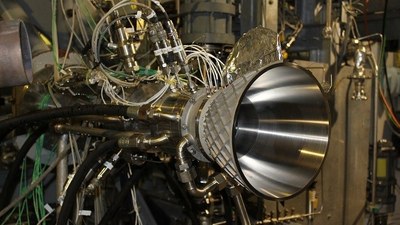Flows



The Flows research group deals with the numerical investigation and modeling of reactive flows and heat transport in rocket engines. The supersonic flow in expansion nozzles and the acoustic emission of the engine exhaust jet are investigated both numerically and experimentally.
There are turbulent and reactive flows in rocket combustion chambers. The fluids reacting with each other in the combustion chamber can be present in the subcritical, transcritical and supercritical pressure range. The numerical simulation of these flows therefore poses a particular challenge. The aim of the modeling is a quantitative prediction of the combustion process in the combustion chamber and the resulting thermal loads on the combustion chamber structure. This work is integrated into DLR projects and plans that have set themselves the goal of developing the "digital twin" in the field of rocket engines. With the digital twin, i.e. the virtual model of a rocket engine, various designs can be fundamentally optimized, compared and evaluated. This reduces the need for costly and time-consuming experimental testing.
Work in the area of expansion nozzles is investigating the potential for performance optimization through the use of height-adaptive and advanced nozzle concepts such as dual-bell and aerospike nozzles. Other areas of focus include transient flow phenomena during engine start-up and shutdown, the asymmetric loads that occur and the acoustic interaction of the exhaust jet with its surroundings. The P6.2 cold gas test bench and specialized measurement technology for recording flow and structural variables as well as acoustic emissions are available for experimental investigations.
